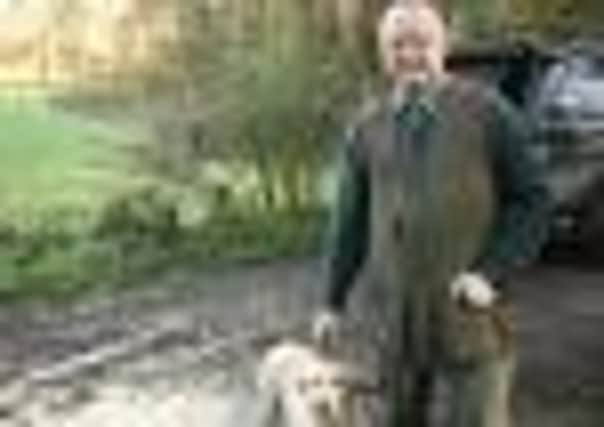Shooting on a friendly scale


The Cherry Tree Inn at High Hoyland normally doesn’t get that busy at quarter past eight in the morning.
But this is where the Cannon Hall Shoot meets for breakfast before setting off into the nearby woods to get food for the other end of the day.
Advertisement
Hide AdAdvertisement
Hide AdThis is a group of friends who have gathered to spend time together in the countryside. It isn’t the kind of shoot that keeps stately homes from going under, this is a world away from shooting as corporate hospitality.
“It’s costed out to break even,” says the shoot captain Steve Lindley.
“Some years we make a small surplus, and that’s carried forward to the next year to reduce the cost. Some years we make a small loss and that’s carried forward to next year’s fees.”
Steve Lindley is a partner in a firm of accountants, and set up the shoot when he was made aware of the estate by one of his fellow partners and he realised the potential for shooting.
Advertisement
Hide AdAdvertisement
Hide AdThe syndicate has six shoots on Saturdays during the pheasant season and six shoots on a Monday, plus a day for the keepers and a day for the beaters, members pay an annual membership fee.
“It’s a group of friends, and friends of friends, we probably have about twelve members. Half of them shoot just on the Mondays, some shoot on both, but on any shoot there are no more than nine.”
Steve Lindley declines to say how much they pay in annual membership. But he does say that the cost, per bird shot, works out at around £25, which he describes as a “median” cost.
He also says the shoot puts something like 90 per cent of the money from subscriptions back into the local community through buying the birds as chicks, the feed and the money that goes to the beaters.
Advertisement
Hide AdAdvertisement
Hide AdThe first drive of the day sees the seven guns standing in a line as the beaters move through a wood on the other side of a minor road. About seven birds are shot. Many fly too low to hit. The weather is glorious, sunny cloudless and perfectly still. Great for those who love being outdoors in the countryside, but for Steve Lindley this isn’t good for shooting.
“Too nice, not enough breeze, high pressure and that keeps the birds down, unfortunately. The birds would have been three times as high if the weather had been grotty. I prefer shooting in grotty weather.”
The bright sunlight also caused problems all round. The pheasants don’t like flying directly into the sun and in the opposite direction, shooting into the sun is also hard.
The shoot has five drives during the morning, on various parts of the Cannon Hall estate. One of them starts with a drive in front of a bank, called Gorse Bank. The shooters then turn round and go for ducks from a pond on the edge of a field of winter stubble.
Advertisement
Hide AdAdvertisement
Hide Ad“They’ll stand out in front of this bank, and then we’ll spin them all the way round and there are some ducks on this pond,” keeper Dave Bowers explains. “They circle round.”
This is unlike the pheasants which tend to fly in a straight line from one wood to another.
George Kitson drives the game cart, a Toyota Hilux pickup truck with a metal frame on the back on which the shot game is hung.
He’s one of the volunteers who helps out. “It’s every two or three weeks, I’m a builder so this can be a rotten time of the year but this gets through the winter and before you know it, it’s February.”
Advertisement
Hide AdAdvertisement
Hide AdOther volunteers include those who bring their dogs along to “pick-up” the shot birds.
Amongst those was Graham Wood, and his dog Cap. For Graham the shoot is a distraction from the golf course and a welcome alternative to shopping.
Cap, a Springer Spaniel three years old, is relatively new but wonderfully obedient.
Graham says: “He works for me, not me for him. I got him when he was 18 months old and he was partly trained when I got him.
“Usually training a gun-dog can take up to three years.”
Advertisement
Hide AdAdvertisement
Hide AdOne of the regular beaters is Derek Hardcastle, a financial advisor in Huddersfield. He is also a Green Party councillor on Kirklees Council, something which he admits might be a strange combination.
Greens are not always seen as the kind of people who might help out at shoots, but Cllr Hardcastle says that shoots like this, and the birds which are shot, fit in perfectly with his beliefs.
“Any food that is reared locally can then be eaten locally as well, that’s as green as you can get.” Cllr Hardcastle points out.
“It helps with keeping the countryside full of all the species that should be there.
Advertisement
Hide AdAdvertisement
Hide Ad“If you start off from the fact that we put food down at times of the year when there wouldn’t be food for anything else that can just come along and eat it.
“A lot of wild birds wouldn’t survive the winter if there wasn’t this food being made available.”